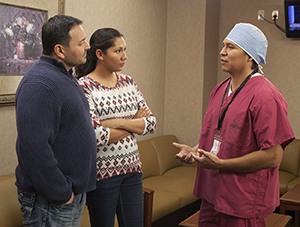When Your Child Needs Emergency Surgery
When Your Child Needs Emergency Surgery

What to expect before emergency surgery
Before your child’s surgery, the following may occur:
You’ll meet with the surgeon. He or she will explain why your child needs surgery and discuss any risks and complications. You’ll need to sign a consent form to give permission for your child to have surgery.
You’ll meet with the anesthesiologist. This is a doctor with training to give anesthesia. There are different types of anesthesia, but your child will likely receive general anesthesia. This medication causes your child to fall asleep and not feel pain during surgery. You may need to sign a separate consent form before your child can receive anesthesia.
During emergency surgery
The surgeon will perform the surgery.
The anesthesiologist will control the amount of anesthesia your child receives. A nurse anesthetist may assist him or her. This person also has training to give anesthesia. Special equipment is used to monitor your child’s heart rate, blood pressure, and blood oxygen levels. The anesthesia will be stopped once surgery is complete.
After emergency surgery
Your child is taken to a postanesthesia care unit (PACU) or a recovery room.
Your child may arrive in the recovery room with catheters or tubes that might have been placed during surgery. These may be in your child's nose, mouth, or bladder. These tubes are present to help your child's recovery. Your child's surgeon or nurse will tell you how long they need to stay in.
You may be allowed to stay in the PACU or recovery room with your child. Every child reacts differently to anesthesia. Your child may wake up disoriented, upset, or even crying. These reactions are normal and usually pass quickly.
Incisions may be covered with a bandage or dressing.
Your child will be given pain medication to stay comfortable. These may be delivered through an IV (intravenous) line.
Monitors will be attached to your child. These check your child’s vital signs.
When ready, your child will be given clear liquids after surgery. He or she will gradually be given solid foods and return to a normal diet.
The surgeon will tell you how long your child will need to stay in the hospital.
Follow all discharge and home care instructions when your child leaves the hospital.
What you may be asked for at the hospital
While you are at the hospital you may be asked to provide the following information:
Identification documents for you and your child (such as a driver’s license or social security card)
Health insurance cards
Proof of guardianship (if you are not the child’s natural parent)
Medical records for your child such as immunization records, previous lab test results, x-rays
List of medications your child is taking
List of any known allergies your child has to medications, food, or latex
Allergic reactions your child may have had in the past to any sedatives or anesthesia
Illnesses or surgical procedures that your child has had
Updated:
October 17, 2017
Reviewed By:
Image reviewed by StayWell art team.,MMI board-certified, academically affiliated clinician,Turley, Ray, BSN, MSN